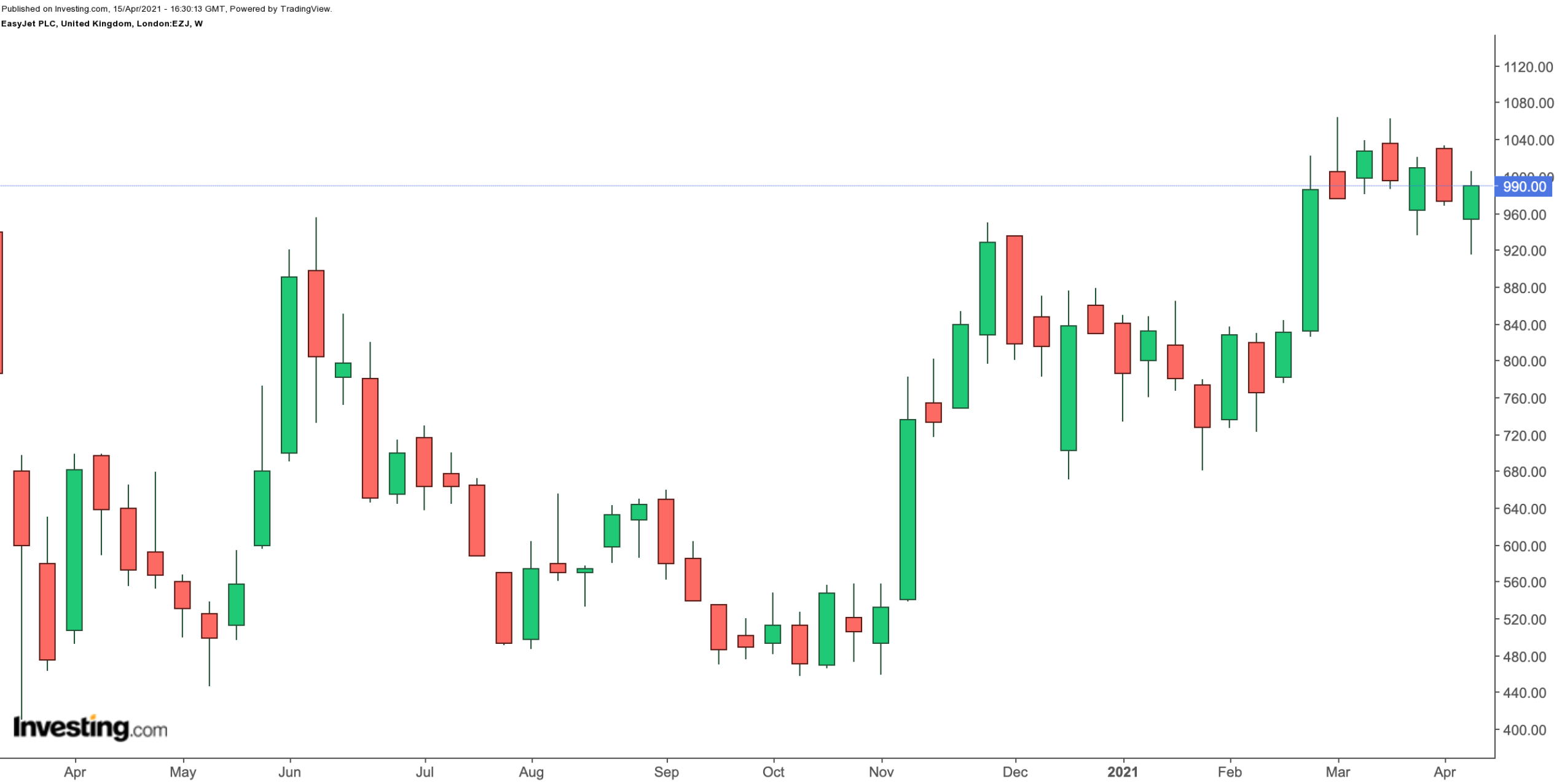In the early weeks of the pandemic, most market participants avoided travel and leisure stocks, especially airlines. But as investor sentiment regarding the economy began improving, so did the share prices of these companies.
For instance, year-to-date, the Dow Jones Travel & Tourism and the Dow Jones Airlines indices are up more than 17.4% and 29.3%, respectively. Since the start of the year, shares of American Airlines (NASDAQ:AAL), Delta Air Lines (NYSE:DAL) and United Airlines (NASDAQ:UAL) have returned more than 39%, 16% and 29%, respectively.
In the UK, airlines have also been among the most traded shares on the FTSE 100 and FTSE 250. Today, we examine FTSE 250 member EasyJet (LON:EZJ) (OTC:ESYJY). In the past 12 months, EZJ stock is up 35%, while YTD returns are about 11%. On Apr. 15, the shares closed at 990p ($13.80 for the US-based stock). Its market capitalization remains at £4.5 billion (or $6.2 billion).

A Low-Cost European Airline
Luton-based EasyJet operates domestic and international scheduled services on more than 1,000 routes in more than 30 countries via its affiliate airlines EasyJet UK, EasyJet Switzerland and EasyJet Europe.
In the UK, almost 50% of the population have had their first dose of the COVID-19 vaccine, and new infection rates have been declining significantly. Thus, the UK is gradually opening its economy.
Yet, for budget airlines like EasyJet, questions about international travel remain, especially in Europe. Some key countries like Germany and France have vaccinated around 20% of the population. Therefore, it might be a while before travel restrictions are lifted, hindering EasyJet’s attempts to bring in revenue again.
Another worry for EasyJet and other low-budget airlines is the suggested requirement to check the vaccination status of travellers. Larger airline companies like International Consolidated Airlines Group (LON:ICAG) (OTC:BABWF), owner of British Airways, may find it easier to implement staff and systems to be able to regulate this.
On the other hand, EasyJet may experience a dent in demand due to expensive COVID-19 testing requirements. Traveling might be only in demand for wealthier passengers, as testing kits cost upwards of £100 (or $138), more than the price of a budget airline ticket. Recent easing of UK restrictions might see "budget” holidays made domestically, rather than abroad this summer.
Given the significant run-up in price in the past year, potential investors would need to ask: How much upside does the stock have under the current conditions?
The UK government is set to announce its international travel plans in early May, which is a date to keep in mind for EasyJet and other airline stocks. Positive news could act as a catalyst for the share price to go over 1,000p. On the other hand, more gloomy news for the sector could mean profit-taking.
Bottom Line
The travel industry is working hard to adjust to the new facts of life, while travel remains at depressed levels, especially internationally. Yet, over the past several months, airline shares benefitted from improved investor sentiment.
However, given the uncertainty regarding European travel over the summer months, we would not be buying EasyJet or other airline shares at these current levels. In recent days, Liberum downgraded EZJ shares from ‘buy’ to ‘hold.’ For EZJ stock, a decline toward 950p or less would improve the margin of safety for buy-and-hold investors.
On a final note, investors who are interested in EZJ stock but do not want to commit capital to a single company, could consider buying an exchange-traded fund (ETF) that holds the shares. Examples include:
